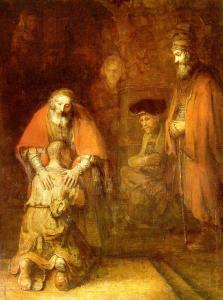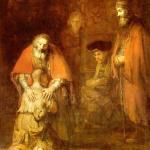The Parable of the Prodigal Son is perhaps the best known story of the whole Bible, rivaled only by the Parable of the Good Samaritan. It is a simple yet timeless story that has captivated generations of Christians and non-Christians alike. What makes this parable so appealing is the hope that it transmits. Generations of men and women have found hope and encouragement in the conversion experience of the young man who insulted his father by asking for his inheritance, misused his gifts and talents, and then returned to his father’s house with intentions that were far from perfect.
What makes the young son return home is not love for his father or perfect contrition, but hunger. The young man realized he could get warm meals at his father’s house. You can hear the young man rehearsing his words to his father to see if the old man would be fooled, ‘I shall say to him, “Father, I have sinned against heaven and against you. Treat me as one of your hired workers.”’
The father however is completely uninterested in his son’s words. He does not even let his son finish what he had rehearsed. The son’s complete, sincere repentance comes after experiencing the Father’s absolute and unconditional love. “His father was filled with compassion; he ran to his son, embraced him and kissed him. Dress him up! Kill the fatted calf!” The young man returned with questionable intentions, but his return was enough for his father to forgive him and for them to be reconciled.
The son’s past mistakes immediately dissolve when he experiences his father’s love and he is transformed into a new creation. This process is not his own doing, but the father’s doing. The father’s love transforms him inside and out.
Father Henri Nouwen, a Dutch spiritual writer, wrote that we are the prodigal son every time we search for unconditional love where it cannot be found. We are the prodigal son every time we seek true love by leaving our own home, the Father’s House, where we are already beloved children. We are the prodigal son when we try to be independent and make it through life on our own without seeking, trusting and acknowledging God. We are the prodigal son when we go into a distant country away from the healing mercy of God.
Some remain away from God because they believe their repentance and sorrow are insufficient or imperfect. Others consider one aspect of their life to be in such disarray that they are unworthy to approach the Lord. Others still get discouraged with habitual sins, vices, and repeated falls and think there is no hope for change.
The parable shows otherwise: we must turn to the Lord with all of our imperfections because it is He who can make us a new person and can help us get rid of the old. We cannot transform ourselves, it is God who redeems. As Lent draws to a close, this is an opportunity to imitate the prodigal son and to return to the Father so He can grant us forgiveness and transform us.
Picture from public domain.













